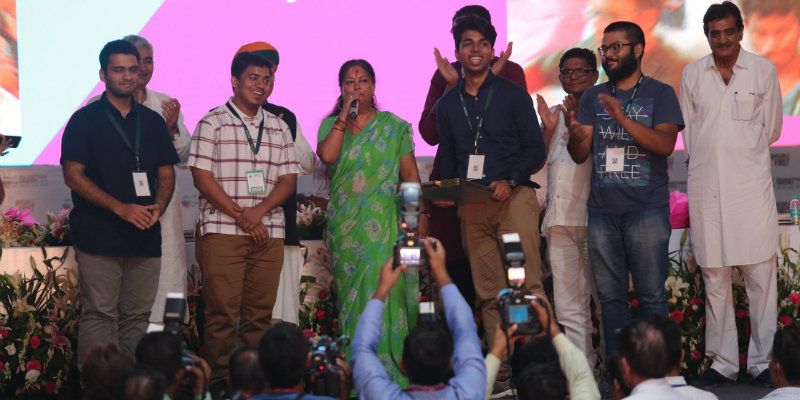Hope over heat: 'Why Smart Cities, why not Smart Huts?' asks a young student in Bikaner
Thirty-four-year-old Surendra Tetarwal has built 200 apps. By day, he works at a government job. By night, the shy yet passionate tax assistant creates apps to help people on everything from general knowledge and maths to Java, C++, and networking, all in Hindi, to help rural folk access the knowledge and information they need easily and without having to pay for it. His apps have notched up 85 lakh downloads. His next project is to create a platform where people can make similar apps by themselves.Surendra isn’t a professional app developer. He doesn’t even live in a metro or even a city. This government employee works with Rajasthan’s Sales Tax department lives in a village close to Sikar district, tucked away in the north-eastern corner of the state. He creates apps because he wants people like him to find better opportunities in life.
“So many people in my area don’t know how to make a better living because they don’t know what opportunities are available,” he tells me. “I worked hard to find a job for myself, and now my mission in life is to get more people from my village, Nani, to find better opportunities, get to know what IT is, how it can better their lives.”When the patchy Wi-Fi at his home slows down, he heads over to his friend’s house to continue working into the night. And he tells me his friend has to pay Rs 1,000 for the connection, not a small sum where they come from.

I met Surendra over the weekend, a weekend where I revisited the innocence of my past and a past of which many of us come from. Hope – unpretentious and with just a dash of raw, unbridled energy that comes from imagination and hope of a better future. This feeling hit me sitting in a hot room with no air-conditioning but surrounded by students who had come from all over India to Bikaner for the Rajasthan DigiFest, hosted by the State Government’s IT&C Department.
Bikaner is not a place you would normally associate with IT and innovation. It’s not easy to reach it if you live in one of India’s metros other than Delhi. The first thing that hits you is the heat. You’re smack in the middle of the Thar Desert after all, just 250 km from the border with Pakistan. The landscape is sandy, punctuated by bramble and boundary walls fencing off forts, palaces, gardens, and havelis, not to mention campuses of defence establishments and educational institutions.
It was at one such campus, the sprawling Government Polytechnic, where I spent a day interacting with students who had come to the DigiFest from Rajasthan and from all over India to compete in Hackathon 5.0. As part of the jury, I got to meet and interact with youngsters with brilliant ideas for new products and businesses. They had coded for anywhere between 24 and 36 hours and had got barely a couple of hours of sleep between completing their submission and facing a jury that picked the final winners.
Many of them had travelled long distances in the blistering heat. And it had done nothing to dampen their spirit or their enthusiasm.

One of them cheekily told me, "Madam, you would have taken a plane to come here, but we were on a train for 30 hours to be here, and so this heat is nothing in comparison."
I was simply blown away when I discovered a team from Poonamallee (a neighbourhood in Chennai, Tamil Nadu). Their train ride too had taken over 30 hours. Their passion was evident when I asked them to tell me what they had hacked? They started off with an explanation in halting English, which also got my attention-deficit mind to think, did they know what they were doing?
I told them, “Why don't you speak in your native language and tell me what you have built? What is the purpose of your hack?” And to my very pleasant surprise, they shifted to rapid Tamil as one of them talked about how their IoT product was meant to make life easier for the visually challenged by creating affordable home automation solutions.
Another said, "Why only smart cities? Why not smart huts in villages for people who cannot afford expensive solutions?”
They wanted their product to get the exposure it needed, and maybe a grant from the Rajasthan government (Hackathon winners took home government contracts).
There was another team from BITS Pilani who built solutions for farmers and to improve their income.
A team of boys from Mumbai had made a drone in just two months. This nifty camera drone finds vulnerabilities (it can sense moving and dead objects) using a set of 6 sensors. The boys ardently believe that theirs is a solution which the Indian Army should use.
Another group from Surat had created an app-based solution to tackle a whole lot of traffic and accident related problems that India’s cities face every day.
I met them in and around airy classrooms that had a distinct old-world charm about it. Coming from a small city myself, the old-world feel triggered a sense of déjà vu. A single-storey building with a yard outside. No 5-star-hotel conference rooms, or folks in suits. Across the road, the grounds had a dozen temporary domes, each of which spanned thousands of square feet and were air-conditioned with the good old noisy air coolers for comfort.
Inside, there were stalls spreading awareness about e-governance and other schemes where men, women and children (many dressed in traditional clothing) stopped by. The robots, drones and holograms were star attractions.
One such dome hosted the Job Fair, where the youth had lined up by the thousands to submit their CVs and get an interview done so that they could be shortlisted for the next round if they couldn’t get an offer on the spot. Unemployment remains a critical problem for India’s economy. The campus-to-corporate gap is a reality. Youth in and around places like Bikaner (or similar towns across India) are at risk of being left out of prosperity that technological progress offers if they don’t get the exposure they need to global realities.
By coming to an event like the DigiFest, students and citizens experienced what others like them, the teams competing at the hackathon, had achieved. They could explore options that they never knew existed. And it was made possible because the government took the lead in setting up an event of this scale in a place otherwise known for its history and associated tourism.
I believe that while it is important to respect our history, preserve our culture and heritage, we cannot ignore a person’s right to want to earn a better living and create a better life for themselves and their family. Technology is the great enabler of our age, a transformative socioeconomic force. Governments need to take the lead in delivering this force into the hands of people and provide the basic building blocks that they can use to build on. It’s the only way that we can change the narrative.
Rather than being a critic, I found genuine admiration for the government of Rajasthan, the Chief Minister, who seems to be on a mission to make the state technologically empowered, and her lieutenant the quiet yet strong Akhil Arora, Principal Secretary for IT&C in the state.
While we keep talking about change and making a difference, I realise that no big corporate, investor or institute will go to Bikaner until the government takes the first step. Rajasthan’s officials have taken the first step and opened the doors to people from India to come to the state not just for tourism but come as partners to create better opportunities for everyone.
We all know that the aspirations of the young are unstoppable. And in meeting the youngsters at the Hackathon, I saw this to be true. I am not being a romantic here, but I will say that if what I saw in Bikaner is any indication, then India is poised for better days because of its youth. Let's give them the opportunity they sorely need.

Rajasthan Chief Minister Vasundhara Raje with Team Venom from Delhi, which won the HackathonMeet @surensikar from Sikar district in Rajasthan, he has built more than 100 mobile apps and mobile app building platform. He works in the sales tax department in the govt. loved to empower the youth with job possibilities #DigifestBikaner#inspiring#Indiapic.twitter.com/5kyaoG6eUx







